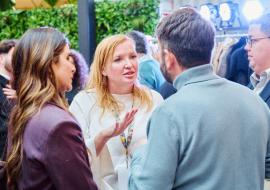Q & A with Gerrit Schotte, Prime Minister of Curacao

Q & A with Gerrit Schotte
Prime Minister of Curacao
By Yndiana Montes
Mr. Schotte was born in 1974, so he’s probably the youngest Prime Minister in the planet. His mother was born in Medellin, Colombia, and his father is Dutch, he speaks Spanish fluently and he tells us his secret: “My mother was always speaking in Creole, but when she was angry and she screamed in Spanish”, he said at the beginning of the conversation.
We talked at the World Trade Center, immediately after the lucid election of Curacao Carnival International Queen, where 10 foreign contesters and one from the host country showed their charms wearing short pants, carnival suit and gala suit. Last year, the contester from Aruba was the winner, but this time the hall was shaken when the jury named the recipient of the prize.
The minister greeted the seven members of the jury, respectfully, asking about the two foreigners, David Cox from Caribbean Bridge magazine, and myself. It was a one-of-a-kind opportunity to know about tourism development in Curacao, and as Schotte kindly agreed to give us the interview, we didn’t miss the chance.
The present Prime Minister of Curacao is cofounder of a “new” party, Movementu Futuro Kursou, MFK. Since the beginning of his political career in 2000, when he was still working as hotel general manager and he was later in charge of international P.R., he began boosting his environmental preserving ideas. Afterwards, a politic coalition promoted him as Commissioner of Tourism, Economy and Agriculture, among other portfolios.
Nowadays, he can’t help developing a passionate interest related to the subject: “Our energy policy has been just promulgated, and alternative energy will have priority, providing broad opportunities and incentives for those who use alternative energies. In Curacao, we have the sun, wind and even waves in the sea, so we’ll develop solar, wind and ocean forced energies.”
What’s the opinion of people in Curacao about that up-to-date point of view?
This is perfectly possible due to the size of our island. Our power consumption will be drastically decreased, and so the cost of life and business.
He certainly didn’t say it because he was running out of time, but while checking his curriculum we found out he has a foundation and he publically probed that it’s possible to supply power to one air-conditioner, two Wi-Fi cell phones and two laptops with a small solar energy system. This is how the young Prime Minister is educating his compatriots.
What are Curacao’s top industries during your administration?
Tourism, Financial Services and the Refinery, in that order.
ISLA Refinery is operated by Venezuelan Petroleos de Venezuela P.D.V.S.A. state company. He didn’t talked about it either because this was a quick interview, in the clamor of a carnival event, but during the speech he gave in 2010, due to the 25th anniversary of CUROIL Company, which is the top provider of oil derivate products in Curacao and Bonaire, he said: “We need to study the future of ISLA refinery. We must make plans instead of waiting until 2019, when the leasing with P.D.V.S.A. will be finished. We have the possibility of operating it in a more ecological way and we won’t stop this economic activity.”
How about the tourism industry, regarding to investments and job generation?
Our plan is growing from the 5.500 rooms we presently have to 8.000 within four years, and bringing more international flags to Curacao, as we already count on Howard Johnson, Breezes from SuperClubs, Renaissance, Hilton and Hyatt among other. It’ll provide new job opportunities for people in Curacao, as tourism is a high scale multiplying factor. In Curacao, we’re proud of our international credentials. We speak four languages: English, Dutch, Spanish and Creole. We attract visitors from all over the world, different market niches because of our cultural and ethnical diversity. Even in the darkest times in regional economy, we’ve grown up in this sector.
There’s no doubt he was talking about the consequences we suffered in the Caribbean after September 11, 2001. Curacao was one of the two Caribbean destinations experimenting an increase in 2002, when our economies collapsed due to the lack of tourists, according to figures provided by the Caribbean Tourism Organization, CTO.
Gerrit Schotten will lead the delegation of Curacao to ANATO Tourism Showcase in Bogota, Colombia, where he’ll have an informal meeting with president Santos, as well as numerous activities, such as MOU with the city mayor. He recently visited the Dominican Republic, also debating tourism subjects with President Leonel Fernandez; and his office is making arrangements for conversations with President Cristina Fernandez, Argentina.
Is there any Spanish investment in Curacao?
It’s nice you mention that, because we’ll travel to Spain in June, for a significant tourism event, and the President of Sol Melia, as well as other important hotel chains in that country, has expressed their interest in meeting us.
Gerrit boosted the “Status Apart”, in effect since last October, thanks to the referendum carried out in those territories, so Curacao is currently an economically autonomous island, just as Aruba made it a decade ago, though Deutschland is still responsible of the defense and foreign policy of both islands and St. Maarten, which recently reached that status. Bonaire, Saba and St. Eustaquis still depend on the Dutch Kingdom.
There’s a reflection to be made: if all the leaders in the region had this vision of what moves the “non-chimney industry”, and tourism is given the political and social preponderance it should have, the Caribbean would be 100 percent sustainable and its people would have a guaranteed future and prosperity.














